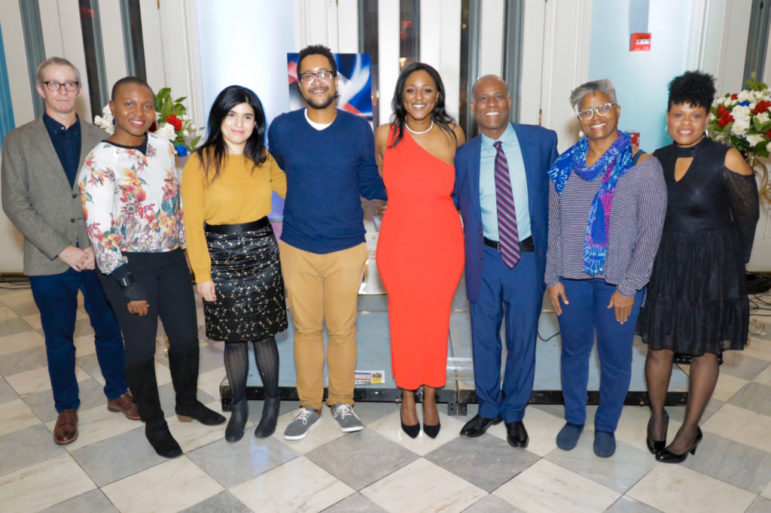
Courtesy Vania Andre
The staff of the Haitian Times celebrating the outlet’s 20th anniversary in October.
This fall, the Haitian Times celebrated 20 years in publication. The news outlet, which covers the Haitian diaspora, has undergone a number of changes since its founding in 1999 by journalist Garry Pierre-Pierre, including its shift from a weekly English-language print paper to an online-only site that reaches readers as far away as Taiwan.
For the last few years, that shift has been spearheaded by first-generation Haitian-American Vania Andre, who joined the Haitian Times five years ago as editor before she was appointed its publisher earlier this year. A journalist with a background in public relations whose previous stints included NBC and the Haitian-American culture magazine Amour Creole, Andre took the helm at the Times two years after its transition to a digital-only site, helping herald in a new era for the publication.
“When I started at the Haitian Times, it was kind of like starting from scratch again,” she said in a recent interview with City Limits. “I really had to think through about how we wanted to position ourselves and bring ourselves going forward.”
Part of that work was retaining the paper’s longtime readers, many of whom skew older and were used to receiving their news in print. Andre described this transition as a “challenge,” but found that maintaining a presence in local Haitian-American communities—partnering with neighborhood groups on events, for example—was key to bringing those readers along for the next phase of the site’s coverage.

Voices of New York spotlights ethnic and community reporting from around the city. Click here to read more.
“So they know that Haitian Times is still there, they see the name, they see the logo,” Andre explains. “It’s a reminder that the paper is still around, and it’s just this extra step of going online that they have to take.”
But dropping its print version opened up new opportunities for the Times, too. While its former print readership had been largely centered around New York and the tri-state area, the outlet’s growing web identity helped broaden its reach across the world.
“With the transition to digital, we are able to really see where all of our readers are coming from,” Andre says. “Those numbers tell an interesting story in themselves that help generate story ideas for us.”
She found readers were clicking on articles from places like Washington, D.C., California, Mexico, Tijuana, Hong Kong, Taiwan, Brazil, Venezuela and Chile.
“It’s really telling of the migration patterns of Haitians across the world,” Andre says. “It’s really telling to see where we can reach, and where we really should be looking to for more stories.”
And, as Andre puts it, “there isn’t a shortage of stories in the Haitian community.” Among the reporting she’s most proud of since joining the publication is their “Haitians in America” series, which profiles Haitian-Americans who are “doing notable things within their communities or their respective field” but who might otherwise be overlooked by the mainstream press. Recent features include interviews with a psychology professor, a film director and a hospitality executive.
The project has been an important way to elevate those professionals making an impact in their fields, and also helps balance out the Haitian Times’ coverage of the political and socio-economic turmoil Haiti has faced in recent years and especially in recent months, when political protests and corruption have brought much of the nation to a standstill.
“We do offer balanced coverage of the community. It’s not all doom and gloom, we really want people to see that—that it’s not one or the other,” Andre says. “The Haitian community, Haitian issues, Haitian highlights, they can all exist simultaneously, not independent of each other.”
The Times is also working on a series of reported stories about major developments that have taken place in Haiti since the 2010 earthquake, as the 10th anniversary of the disaster approaches next year. That series will look at the different political and economic issues the country is facing and how that ties into expectations people had for the recovery process, Andre says.
Looking ahead to the next 20 years of the Haitian Times’ coverage, Andre says she aims to make the publication more than a news site “where people can just come and consume.”
“We really want to create a platform that our readers can engage [with],” she says.
That effort includes a new project currently underway called Bel Machann, an e-commerce website where Haitian artisans can sell their wares—something that’s become increasingly untenable for them to do back home, where the economy has been more or less paralyzed by protests and political unrest.
“You have an island full of these artist entrepreneurs that have amazing products, but they have no market and no way to really make a living for themselves the way that they want to,” Andre says, explaining that the site will help “leverage some of our access and resources.”
“Now the diaspora can give back… in a way that’s more than just sending $100 through Western Union,” she says. “They’re actually supporting the artisans in Haiti and giving them access to the American dollar in a different way.”
Is there a media outlet covering NYC’s ethnic communities that Voices of New York should spotlight? Send suggestions and feedback to Jeanmarie@citylimits.org.








